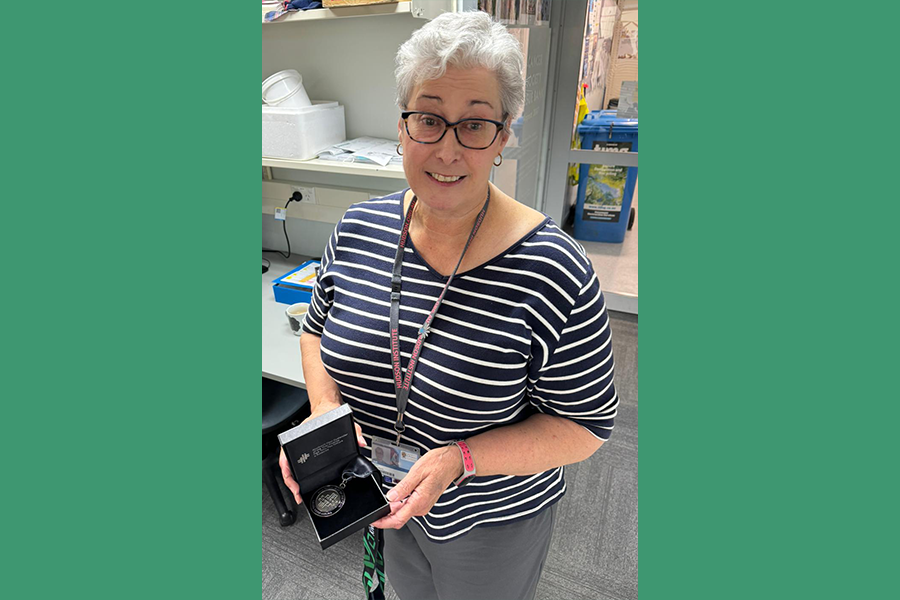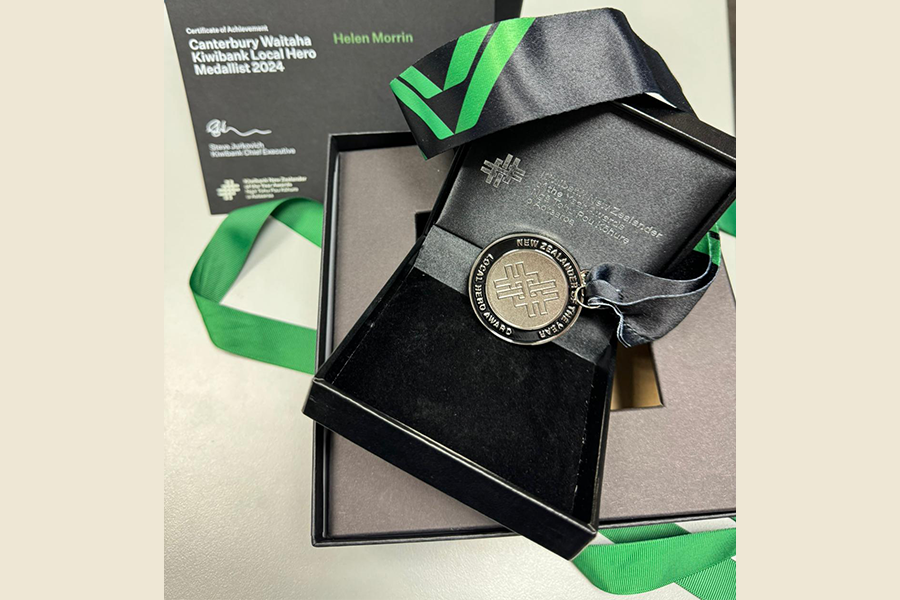
He Taonga Tapu Cancer Society Tissue Bank curator Helen Morrin has won a Kiwibank 2024 New Zealand Local Hero of the Year Te Pou Toko o te Tau medal. The tissue bank is a part of University of Otago's Christchurch campus.
In what’s proving to be a stellar year for recognition of her commitment and dedication, University of Otago, Christchurch’s Helen Morrin has been recognised with yet another honour.
Morrin, the curator for cancer research unit He Taonga Tapu Cancer Society Tissue Bank (HTTCSTB) has been awarded a Kiwibank 2024 New Zealand Local Hero of the Year Te Pou Toko o te Tau medal for her 23 years of unwavering service in transforming the campus’s tissue bank into an internationally renowned facility.
This latest accolade comes hot on the heels of Morrin winning the 2023 New Zealand Society for Oncology Bridget Robinson Award in October for her exceptional career in translational cancer research.
In the citation accompanying Morrin’s latest achievement, the award judges praised her exceptional dedication, declaring that her work has provided patients the opportunity to donate surplus tumour material for the benefit of future research. They said that amidst major challenges such as the Ōtautahi Christchurch earthquakes, Morrin managed to keep the HTTCSTB operational, regularly entering the Red Zone-stickered medical school building to maintain and service the tissue bank’s freezers.
In a statement, Kiwibank Chief Executive Steve Junkovich said Morrin’s tireless commitment to community service and research advancement is truly remarkable, not just locally but internationally.
“Congratulations on your outstanding achievements that have led to this recognition by your peers, whānau, friends and community.
‘You are a role model to us and many New Zealanders,” Junkovich stated.
Morrin says the award is a team effort.
“I’m proud of the excellent cancer research we achieve here in Christchurch and it’s a privilege to be a part of it.
“This award honours all who contribute to research, from our patients to medical teams, surgeons, pathologists, tissue bank staff and scientists,” Morrin says.
Morrin’s Mackenzie Cancer Research Group colleagues in the campus’s Department of Pathology and Biomedical Science say this is a significant achievement for Morrin – one which deserves to be celebrated.
“Helen and the tissue bank are local treasures which have shaped our cancer research,” says Professor Gabi Dachs.
UOC’s Associate Dean Research, Associate Professor Logan Walker, is similarly grateful for Morrin’s work.
“Helen’s hard work has enabled our community to play a critical role in addressing many different public health concerns,” Associate Professor Walker says.

The award recognises Helen Morrin's unwavering service which helped transform the campus's tissue bank into an internationally renowned facility.
The Kiwibank 2024 New Zealand Local Hero of the Year awards are intended to provide a national platform to amplify and celebrate remarkable moments and people – recognising New Zealanders across the country who are shaping Aotearoa New Zealand for the better. The award adjudicators say they demonstrate a purpose of Kiwis making Kiwis better off, by celebrating and honouring people such as Morrin.
As the curator of the tissue bank in Christchurch, Morrin manages all aspects of the biobank, including the collection, processing, storage, retrieval and distribution of human tissue and data for research.
She has built an Aotearoa-specific collection of samples which were donated by more than 14,500 cancer patients.
She has actively shaped the careers of generations of cancer researchers since her role began in 2000 and she was first charged with fulfilling the vision of medical oncologist and Clinical Director of the UOC’s Mackenzie Cancer Research Group Professor Bridget Robinson who the award is named after.
Professor Robinson’s vision was for a biobank of stored cancer samples that was open to New Zealand researchers to apply for use. When Morrin started back in 2000, there was no guidance, policy or legislation to help turn this into a reality.
“It’s been a real journey to shape biobanking, making sure it’s highly ethical, culturally sensitive and grounded in appropriate legislation,” Morrin says.
Morrin is also a member of the University of Otago’s Human Ethics Committee, regularly providing guidance to researchers and postgraduate students on biobanking to ensure that only necessary and appropriate samples are used, enabling efficient and quality research outcomes.
Additionally, she chairs the Science Policy Advisory Committee of the International Society for Biological and Environmental Repositories (ISBER), where she is recognised as their leading expert in ethical and cultural practices as well as disaster recovery management.